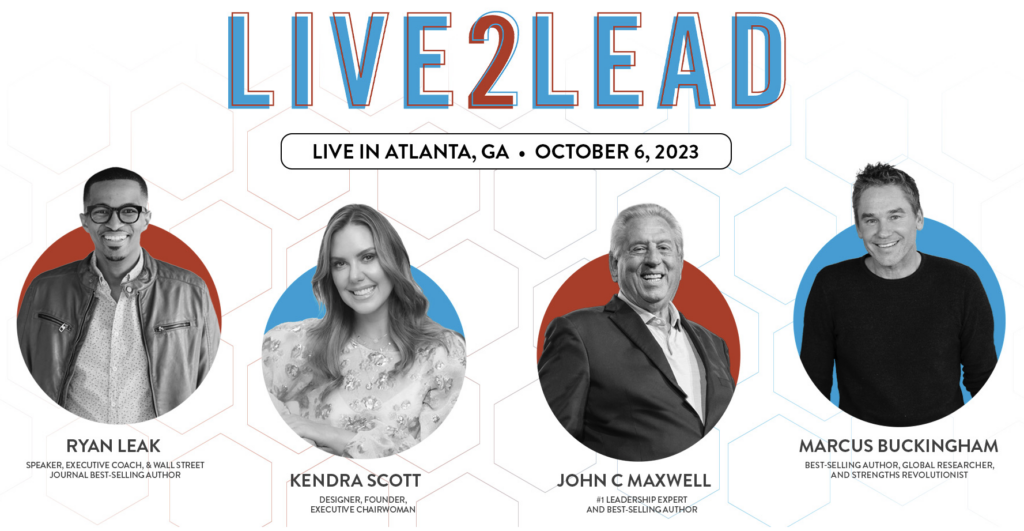Executive Podcast #260: 5 Decisions to increase Personal Productivity

In this episode of the Maxwell Leadership Executive Podcast, we discuss how to increase personal productivity and the five essential decisions leaders need to make in order to boost their efficiency and achieve remarkable results.
Do you have your tickets to Live2Lead? Use the code CLPODCAST at checkout to receive 10% off any tier ticket, plus an additional 10% off with General Admission ticket orders of 10 or more!
Download our Learning Guide for this podcast!
Perry Holley:
Welcome to the Maxwell Leadership Executive Podcast, where our goal is to help you increase your reputation as a leader, increase your ability to influence others, and increase your ability to fully engage your team to deliver remarkable results. Hi, I’m Perry Holley, a Maxwell leadership, facilitator and coach.
Chris Goede:
And I’m Chris Goede, executive vice president with Maxwell Leadership. Welcome and thank you for joining. Before we get started, if you’re interested in downloading the Learner’s guide, or maybe even you want to learn a little bit more about some of the work that we do, we talk a lot about the fact that our discussions are coming right out of our coaching calls that we’re having with team members and executives and organizational employees around the world. And so maybe you want to learn a little bit more about that. I want to encourage you to go to Maxwellleadership.com/Podcast, and there I want you to click on this podcast and then fill out that form at the bottom and let them know that you’re interested in learning a little bit more about coaching. Also, Perry would probably kick me on the table if I didn’t say this. If you have a leadership topic or a challenge that would help him, he drives all of these topics every single week for us. How many weeks is 260 episodes? That’s amazing. So very excited about that. So we’d love your help. Put your name there.
Perry Holley:
Perry will give you a topic Perry hasn’t talked about.
Chris Goede:
Oh, there’s a good challenge.
Perry Holley:
260.
Chris Goede:
Put that form in there. We won’t cross reference it. We’re just going to use it, but we’ll say that we hadn’t had it. So we would love to hear from you on that. Well, today’s topic is the five decisions to increase productivity. Man, every leader wants to understand that word.
Perry Holley:
Car is pulling off the road.
Chris Goede:
That’s right. That might be the first one they ever listen to completely. But when we think about this, we think about productivity. As a leader, we don’t think of doing the most things. We think about what are the right things that we need to be doing now as a leader. We may end up defaulting back to trying to do most things and maybe get away from doing the right things, but that’s really what we need to be focused on, and we need to make sure that we’re not wasting our time as a leader. It goes back to thinking about some of the things, what are the things that only you can and should be doing? So today’s topic and conversation is really around our leader, our founder, John Maxwell, and some of the things we pulled out of a lesson that he has developed around being more productive.
Perry Holley:
And I would love to tell you this came from a coaching call and some big needs of my coaching clients. Unfortunately, or fortunately, it came from my own struggles in this area and something that I have been dealing with. We have been teaching a lot recently. We have a course that we offer on today matters. That’s a little half day course, but it’s really around how do you get more productive, how do you organize your life, how do you manage time, manage priorities, those types of things. So I’ve been working through that for years on my own productivity and putting in systems and ways that I can make better choices on that. And I’ve just noticed I know I’m busy and I know you’re busy and I know everybody that you and I know are busy and everybody they know.
Chris Goede:
Is when we walked in today, matter of fact, we asked Jake, hey, how you doing? He’s like, I’m busy, covered up. Right. Matter of fact, he left. So we’re running the board, everything by ourself today. He said he’s out of here.
Perry Holley:
So if you notice the quality is.
Chris Goede:
We’Re going to have all kinds of normal outtakes will now be intake is.
Perry Holley:
Part of the episode, but the question I think we should ask is busy doing what? Yeah, to your point, there’s no lack of things to do, but busy doing what?
Chris Goede:
Yeah.
John Maxwell:
Hello, this is John C. Maxwell, I’ve been teaching leadership for over 40 years. We’re gathering in Atlanta for our 10th Live to Lead Leadership Conference friday, October the 6th, and I want to personally invite you to join us. Live to Lead is about empowering you to live out leadership, not just learn it. World class leaders Kendra Scott and Marcus Buckingham and Ryan Lee will be joining me to impart wisdom, inspire change, and help you lead more effectively. Hey, bring your team. Groups of ten or more receive a significant discount. So let’s grow together. Because leadership isn’t a solo journey, it’s best experienced in community with others. Visit Live2lead.com today and let’s make leadership a lived experience.
Chris Goede:
The first decision in order to increase productivity that we really need to think about and to make is to determine not to know everything.
Perry Holley:
Wow. Yes.
Chris Goede:
You don’t need to know everything. And I know John talks about, and as he kind of references this, he talks about two things. The smart people that he has around him right. Who know the details that he doesn’t know. You don’t need to know all the details, but you do need to have a team of people around you, men and women that have those answers. The other thing is that with John now, John’s teaching this, so he has an executive partner that handles all of the details of his calendar, of everything that meetings, what is it, what are the takeaways, and so they keep all of that in front of them. And so he knows that, he doesn’t need to know that. But he has people around him that absolutely know that. Many leaders, including myself, we try to keep up with every single detail in my life, every single detail in the different business units and what that looks like. But we do not need to do that. We don’t have to know everything. We just need to make sure that we are doing what we are supposed to and can do.
Perry Holley:
That’s funny. I saw a quote from Marcus Aurelius that made me smile, but it also made me cringe a bit that it said, if you want to improve, be content to appear clueless or stupid in extraneous matters. Don’t wish to seem knowledgeable. And when I did a deep dive years ago into where does my time go? And I found a large portion was going on to being informed about things and it could be at work. You said, checking in on every project, checking in on every detail. But I also noticed in my personal life, seeing every newscast, seeing whatever the popular show at the time know and give away my age. But it started with Dallas and then it came up to Notch Landing and then it’s Grey’s Anatomy and then all the local sports teams are playing and all that and I don’t want to be at the office tomorrow. And somebody says, did you see what happened on Notch Landing last night? I go, I wanted to be in the know and I just love it. He says, don’t wish to seem knowledgeable. Can you let some of that go? And so to your point about at work, is that do I have competent people on my team? Can they run the project? Can I know what I need to know, but I don’t need to know everything about that. So I have to become perfectly fine by saying I don’t have a clue when somebody says, did you see what the president said last night on the new I did not. Did you see on the new Netflix special? I go, I did not. And so I feel like I’m clueless and loving it. Clueless and loving freeing me up to say I don’t really need to know all that. And the fact that you just it’s not a good use of my time to watch every single thing I can watch or at work to know every single thing I could possibly know. Right. I can’t do it.
Chris Goede:
Use that time to become more educated and competent in the area of which you’re leading would be extremely beneficial. I think that is something that all of us could challenge ourselves with.
Perry Holley:
How many people you think said, Dallas, what’s that?
Chris Goede:
Well, I was going to say that to you, but I didn’t want to interrupt the flow because then you went to some show called Not Slandy. I don’t know the gap between the two of us, but I think it’s greater than what I okay. Boomer. That’s exactly right. Well, the second decision is determined not to know everything first, be okay again. This goes back to the knowledge thing. John talks about being comfortable, not being in the know about every detail in the business. First, let other people educate you. Let them help you learn about certain things in the business of what’s going on. He encourages us to move decision making and problem solving to those that are closest to the problem. And we could sit in a boardroom, we could sit in our office, we could be thinking about, well, here’s how we’re going to solve this problem, here’s how we’re going to do that. But that may not even work to those that are out in the field every day. And there’s a huge gap there. That because we want to act like we knew it first or we came up with it first. We don’t need to know everything.
Perry Holley:
I think this is really big because you could be actually becoming a bottleneck to what’s going on. Everybody feels like they got to come back and feed it through you. And that you need to be in the know and you need to know first. Don’t let Perry not know you go, no. Productivity, not only my productivity is affected, but it affects the productivity of the whole team. So this is where we talk about the skills of empowering people, the skills of delegating to people become so important to what we do that you need to, like you said, move the nexus of control outward to where decisions are being made. And if everything’s got to come back through you, because you need to be first to know, that’s going to be a problem, that’s good.
Chris Goede:
Well, the third decision that can increase your productivity is to determine to let someone else represent you. Now, we may get a lot of people to just shut this podcast off. Remember, this is John’s Content, not Perry’s or Chris’s. No, I’m just kidding. But you look at this and you go, man, this takes a lot of trust for me to be able to do that. And it must be developed over to it’s not going to happen right away, right? Like, Perry and I have worked together for a long time. Perry started off by coaching me. I have a lot of trust in Perry. There’s absolutely no doubt in my mind that if I couldn’t be somewhere, I needed to be somewhere that Perry could step in and represent myself and the organization at a level that would be the same, if not better. But it takes a little bit of time, and you do take the chance of maybe somebody might misrepresent you of doing something wrong that could negatively affect your reputation. But you’ll know that over time and you’ll learn, and that’ll be part of it. I was unable to make a meeting one day last week, and so actually it was two weeks ago, and my personal schedule conflicted with something. So I asked my executive partner, hey, will you sit in and listen? And so be a part of that. And so the value and the representation of there because there’s trust. People have now asked me not to return to that meeting, and they want her to come back. But when you get to that point and allowing people at certain times for the right reasons, the right meetings, the right situations, you need to let somebody else represent you.
Perry Holley:
I think about this all the time, and actually, we’re doing it right now. We are speaking from the front. And so yesterday I was in front of an office, an audience representing the Maxwell Leadership Organization and representing John Maxwell. I speak as if I were him. I have his authority to do that. But it didn’t just come by accident. I just didn’t stumble into that, and nor did you. We built some trust. We learned the message, we developed how we speak that way. We got John’s blessing on doing that, and we go forth. Now, John can’t be everywhere all the time. If you ever hear John talk about why he started writing books, which total over 100 books now, and tens of 30, 40 million sold, it’s huge. Why did he do that? Because he said when I’m speaking, I can only speak to certain people at that time. But if I write a book, I can extend my reach to other places. And then by having us and the entire Maxwell Leadership team out there representing him, he’s putting trust in them to do that. But he’s empowered us to go out and to do that. So it’s the same true for every leader that’s listening to this message right now is you can’t be everywhere, you can’t do everything. Are you empowering and preparing and building trust in the people on your team to speak on your behalf, to go forward? And that will free you up to do the things that only you can do? And so I love this one.
Chris Goede:
I think you go when you begin to understand and do that in the right way, I think you go from addition to multiplication of the productivity level.
Perry Holley:
It’s the leader’s greatest return.
Chris Goede:
It is the greatest leadership. I love that leader’s greatest return. Well, decision number four is to determine to focus on strengths that you have and not fixing weaknesses. The best leader have a great understanding of their strengths and their weaknesses. Now, when we say this, I often like to throw in make sure that the weakness that you have is not a fatal flaw that is a little bit different.
Perry Holley:
John says you need to be aware. If your weakness is character, fix it immediately.
Chris Goede:
Yeah, that’s right. But you got to be aware, right. The critical factor behind this is knowing that about yourself as a leader and becoming aware. And so make sure you know who you are and then who you are not. And then also make sure that you’re not trying to be all things to all people, because that’s going to lead into some of your weaknesses that it’s not going to show up.
Perry Holley:
Well, it’ll kill your productivity for sure if you’re trying to be everything to everyone. But when you’re really clear about your strengths and weaknesses, it does two things for you. One, it lets you know who you need to hire. That’s good, because I can now fulfill my weaknesses with someone who’s strong in that area. And then two, it lets me know what I need to delegate into whom. And if you’re trying to be everything, I ask this all the time in a room. I said, how many of you really believe that delegating is a great thing? Oh, me. How many of you are delegating? No, not me. They start looking at their shoes. Why are you not delegating? Well, I can just do it better myself. It takes as long I don’t trust them. You hear 100 reasons, and none of them are worth anything. If you’re not delegating, it’s because you’re not doing the work to prepare the people on the team. And it’s on a scale of trust. How much do I trust somebody to go speak for me, to go do things for me, to get things off my plate so I can focus in my areas of strength? And by the way, they can focus in their areas of strength. There’s nothing more beautiful than everybody on the team working in their strength areas. But you spend time working on weaknesses because you think, I want to be better at doing spreadsheets. No, I have people on my team that do amazing spreadsheets, and they love it. I can’t believe it because I hate spreadsheets. But there are people that love spreadsheets, as odd as that sounds to say out loud. There are people that love spreadsheets, and they’ll do an amazing job, so why not just let them do it?
Chris Goede:
Yeah, I think there’s a gap between the word delegating and developing. Right. I think a lot of people are like, oh, yeah, we should delegate. And it has a negative connotation at sometimes because people are like, well, they just didn’t want to do that work.
Perry Holley:
Just delegating, not dumping.
Chris Goede:
That’s exactly right. Yeah. And so I think as you think about this, it’s like, how do I develop that individual or make sure that they’re developed to then be able to have them partner or walk alongside or handle that project for me moving forward. And I think some of you are like, when they think about delegating, it’s just like command and control, like level one leadership that we talk about, and it doesn’t come across well, so then people don’t necessarily want to do it.
Perry Holley:
I always tell folks, though, I saw Michael Hyatt had on, if you can just Google that five levels of delegation. Michael Hyatt’s little graphic. I just loved it because it’s built on a scale of trust. But how do you start? You start small by just do exactly what I tell you to do. And then you maybe say, tell me what you would do, but don’t do it. I’ll do it, but tell me what you would do. And then three, maybe you tell me how you would do it and show me the proposal, and maybe I’ll do it with you. And then level four, go do what you think, but come back and tell me what you did. And level five, go do it. But you don’t just start by go do it. That’s where we get in trouble. I don’t trust you to do it, and so I think I’ll do it myself. No, you start slow, but it is on. You’re developing to your point. You’re developing over time to have that trust to go delegate.
Chris Goede:
Yeah. All right. And finally, the fifth decision that you need to make to increase your productivity as a leader is to determine to take charge of what takes your time and attention. You got to determine that. You’ve got to take charge of that. And John says, it’s not about, will my calendar be full? I love this. He says, but who will fill my calendar? He evaluates that every single month, every single quarter, every single year, and goes through. And it’s like, what do I need to make sure I take off? What do I need to add? And so be highly aware of that and how your agenda is setting up on a daily basis. And so I’d love your thoughts on that. And then just kind of wrap us up for today, if you don’t mind.
Perry Holley:
Yeah. If you don’t schedule your time, someone else will. I’ve learned that leaving my calendar open was a big mistake, that I would let you fill my calendar and I would take what was left over. Big mistake. So I became a big fan of calendar blocking to say, this is what I’m going to do with my time, and then I give what’s left over to others. And I know John talks about how does he determine what he should be doing? He talks about the three R’s, what is required of me. So there are certain things each of us have that are required of us every day that we must do every week, every month. So make sure that’s a key piece of that. What is the return on investment of that time? Where is my greatest return? So if these things are required, where’s my greatest return? And then where’s the greatest reward? So what’s required? Return and reward? You start looking at that, saying, that’s where I should probably be spending my time in investing that and blocking off my calendar to do that. When I’m clear on those things again, productivity begins to happen. So I love this topic, I think, encourage each of you to consider taking intentional approach to your productivity. It requires sometimes about how do you capture your inputs that are coming at you every day? How do you put those into a system. So you can prioritize those things, not let them just in order of no, no, not everything’s equally important. So making sure you’re working on important things, not just urgent things. And then prioritize that. Learn to get things that aren’t that important or not to. You should be delegated, but they still need to be done. Get them off to somebody else. So use those tools that you have. As Chris told you at the top of the broadcast, if you’d like to learn more about our offerings, get the Learner guide for this issue. If you’d like to leave us a question or a comment, you can always do that at MaxwellLeadership.com/Podcast. We love hearing from you. We’re very grateful you’d spend this time with us today. That’s all from the Maxwell Leadership executive podcast.
To be a Successful Leader, You Need Feedback on Your Leadership.
We’re excited to announce our new and improved Organizational Effectiveness Survey (OES). The OES gathers feedback from employees to give leaders and management the knowledge and action plans needed to develop a more effective and productive work environment. Our new version measures 4 areas of your business: Leadership, People, Strategy, and Performance.














Be the first to comment on "Executive Podcast #260: 5 Decisions to increase Personal Productivity"